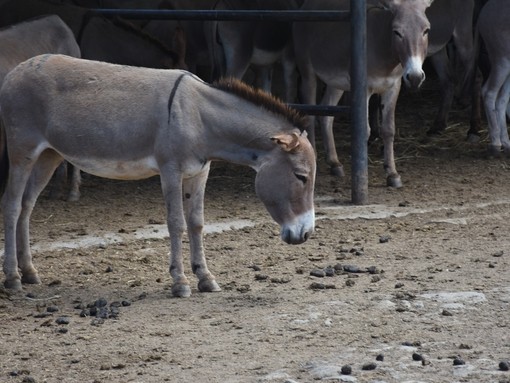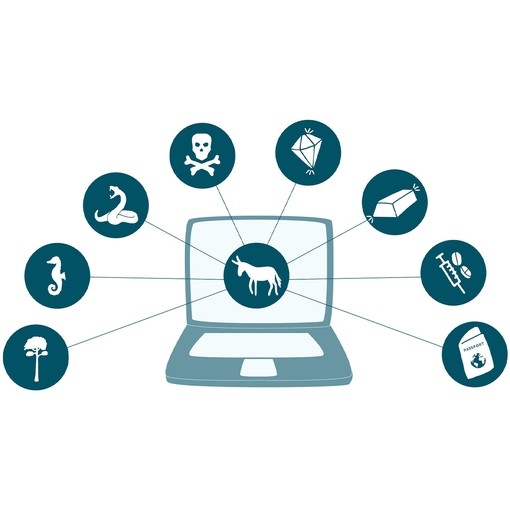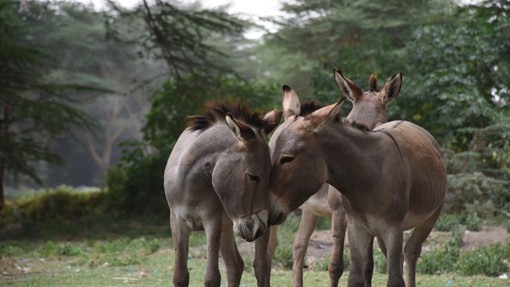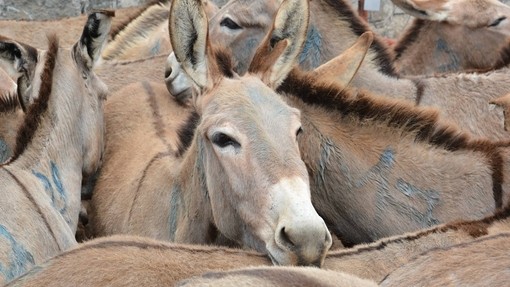
Donkeys are facing catastrophic cruelty from source to slaughter
The devastatingly cruel global trade in donkey skins sees donkeys suffer in appalling conditions as their populations face decimation.
Donkeys suffer at every point of the skin trade. From source to slaughter, brutal and inhumane conditions are a hallmark of this industry.
Even the most vulnerable donkeys, including pregnant mares, young foals, and the sick and injured, are taken and traded without consideration for their welfare or suffering.
Across Africa, Asia and Latin America, donkey populations are being wiped out, and communities that depend on their donkeys for support are losing valued animals.
The loss of cherished donkeys disproportionately impacts women and girls who are left to pick up the ‘donkey work’, reducing their economic independence and denying them the opportunity to continue their education.

Donkeys are facing catastrophic cruelty from source to slaughter
Donkeys are highly intelligent, charismatic and sentient animals who form lifelong bonds.
The appalling treatment and the intense suffering they endure at every stage of the donkey skin trade is unethical, unacceptable and often illegal.
Donkeys may be transported or marched long distances to slaughterhouses without food, water or rest. Held for days without shelter or care, the trade in donkey skins is a gruesome and brutal business.
Donkey populations are being decimated
Ongoing high demand from the ejiao industry drives the cruel and unsustainable slaughter of millions of donkeys every year.
We estimate that nearly one in ten of the world’s donkeys are killed for the skin trade every year.
That’s 4.8 million donkeys slaughtered, with 3 million skins shipped from Africa, Asia and Latin America to China for processing into ejiao. The donkey is now one of the world’s most trafficked animals.
Donkey populations in some countries have been decimated. Where donkeys were once plentiful, local sources now describe them as scarce.
Livelihoods are destroyed, and women and children are particularly impacted
Donkeys disappearing into the skin trade are taken from low-income communities. Their donkeys are often their main or only source of income.
In many households, women and children look after the donkeys. If their donkeys are stolen and slaughtered for their skin, they lose a part of their family and a vital source of independent income.
If their donkey disappears, women and children often have to pick up the additional workload, hindering their educational opportunities, independence and gender equality.
There are biosecurity risks to animal and human health
The slaughter of donkeys for the skin trade is often illegal or unregulated, carried out in dirty conditions with complete disregard for donkey welfare.
The skins undergo minimal treatment before shipping, and the risk of contamination is high at every stage of the process.
The movement of millions of untreated skins worldwide risks spreading infectious diseases harmful to both animals and humans.

Local ecosystems are suffering from pollution
The skin is the most valuable part of any donkey slaughtered. The unregulated nature of the trade means there are few incentives to use the remainder of the body.
Donkey carcasses are often discarded, piled up and left to rot. Runoff from these improperly disposed of corpses pollutes the surrounding air, water and land.

Organised crime uses the skin trade
In countries where the sourcing and slaughter of donkeys for export is legal, laws are inadequate and often unenforced. Where the skin trade is illegal, the trade uses the black market – with virtually no policing.
Organised criminals use the donkey skin trade to hide other illegal activities including endangered wildlife trafficking.
Help stop the slaughter
Find out more
Learn about the traditional Chinese medicine that is driving the demand for donkey skins, and the possible alternatives for a humane future.

Learn about our approach to challenging the donkey skin trade and bringing a permanent end to the skin trade.

Find our reports on the donkey skin trade. We regularly publish reports based on our findings from investigative work.

Learn about cellular agriculture, a way of sustainably and humanely creating donkey collagen without the need for live animals.

Find out about the criminal elements currently using the donkey skin trade as a smokescreen for other illicit activities.

Millions of donkeys are slaughtered for their skins every year. Learn about the causes, impacts and the campaign to Stop the Slaughter here.
